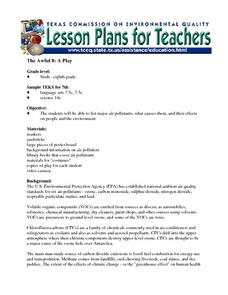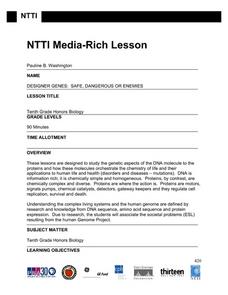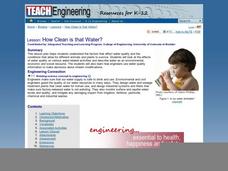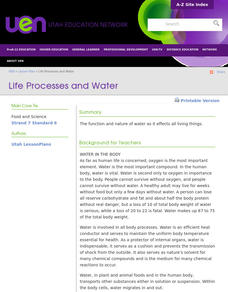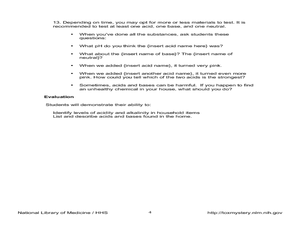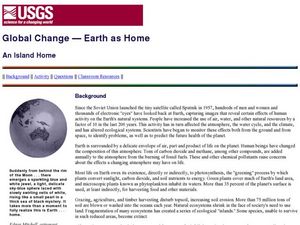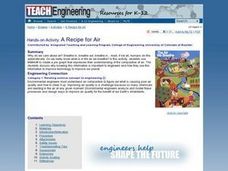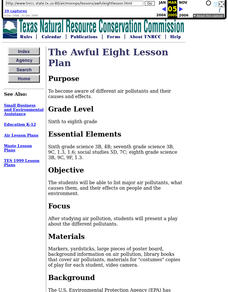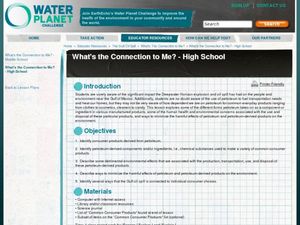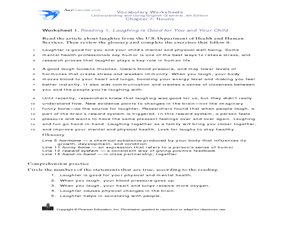Curated OER
Wildlife Study Comparison
Students compare/contrast two studies that examine the effects of environmental contaminants on animals. They read an article, identify the components of a research study, summarize the article, and complete a matrix.
Curated OER
The Risk-Benefit Factor Challenging Our Environment
Seventh graders examine the factors that are contributing to the degrading of the Earth's environment. In groups, they analyze the types of hazards when dealing with pests and give an example of each. For each situation given, they...
Curated OER
The Awful 8: A Play
Students perform a play that presents the causes and effects on people and the environment of the eight major air pollutants.
Curated OER
The Ozone Between Us
Students investigate how ground level ozone occurs in many areas of the country. They study the ozone problems that are associated with population centers.
Curated OER
The Awful Eight
Students investigate the concept of a carpool and its contributions to either reducing or increasing air pollution. They conduct research using a variety of resources for background information. The information is used to write a play...
Curated OER
Temperature and the Tomato
You will need a photovoltaic system and monitor at your school in order to obtain all of the data required to thoroughly implement this lesson plan. Your class monitors daily temperature and insolation amounts over a two week span of...
Curated OER
How Clean is the Water?
Students read about and discuss water and how it is used as a resource and how engineers use technology to preserve it. In this water lesson plan, students look at a picture of water treatment and tell what is wrong with the picture.
Curated OER
Life Processes and Water
Explain the properties of water. Identify the properties of water that make it a polar molecule Describe hydrogen bonds and how they differ from covalent bonds Discuss the differences between hard water and soft water Compare the heat of...
Curated OER
Acid or Base? Toxie's on the Case
Students recognize the difference between acids and bases. In this ToxMystery lesson, students play a computer game and experiment to find the difference between acids and bases. Students use litmus paper to determine if household...
Curated OER
Let's Heat Things Up!
Students build and evaluate simple models to understand the greenhouse effect. They explore the role of increased greenhouse gas concentration in global warming, and the implications of global warming theory for engineers, themselves...
Curated OER
Global Change- Earth as Home
Students create their own environment. In this environmental protection instructional activity, students pretend they are the owners of a tropical island. They create jobs for the citizens and develop the island as a model environment.
Curated OER
Benefits of Biotechnology
Various aspects about the impact of biotechnology in our everyday lives, and many examples of its application are given in these slides. Designed with multiple fonts, the style should be appealing to youth.
Curated OER
Global Warming Statistics
Students research real-time and historic temperature data of U.S. and world locations, and analyze the data using mean, median, and mode averages. They graph the data and draw conclusions by analyzing the data. A spreadsheet is used to...
Curated OER
A Recipe for Air
Students create a pie graph using M&Ms to demonstrate the composition of air. They label each section of the graph, and list the fractions from largest to smallest.
Curated OER
Computation: How can we use rice to solve problem questions?
Fourth graders graph metric tons of rice produced by various countries. In this graphing lesson, 4th graders follow problem solving steps to answer questions about rice nutrition and then graph the amount of rice produced by several...
Curated OER
Introducting the Concept of Medical Ecology
Tenth graders examine the effects of the breakout of the West Nile Virus. They make predictions on its origin. They develop and present an action plan to stop the virus from spreading.
Curated OER
Transmission of Disease
Students provide names of viral diseases that they would possibly like to be infected with today; listing them on the Smart Board. They then come to an agreement about what virus to use and use beakers of fluids to simulate how viruses...
Curated OER
The Awful Eight Lesson Plan
The students list major air pollutants, what causes them, and their effects on people and the environment. Students list ways they can prevent or reduce the types of air pollution mentioned in the play.
Curated OER
The Awful 8: The Play
Students become aware of the cause and effects of different air pollutants. They present a play about the different pollutants.
Curated OER
The Reality of War
Students use research materials developed earlier. They synthesize data to formulate an argument for or against war. Students use their notes to address what the possible answers could be.
Curated OER
What's the Connection to Me?
Students discuss the impact of oil spill to the environment and to their daily lives. In this environmental science lesson, students research the pros and cons of petroleum based products. They share their findings in class.
Curated OER
EPA Pesticides Reduction
Students examine the effects of pesticides on the environment and bugs. They answer questions as an assessment.
Curated OER
Laughing is Good for You and Your Child: Reading Comprehension
For this reading comprehension worksheet, students read a passage pertaining to laughter and then respond to 5 true or false questions regarding the passage.
Curated OER
Cloning And b-Galactosidase
Students investigate cloning using E coli cultures. Through laboratory exercise, they determine if E coli cells contain b - galactosidase.




